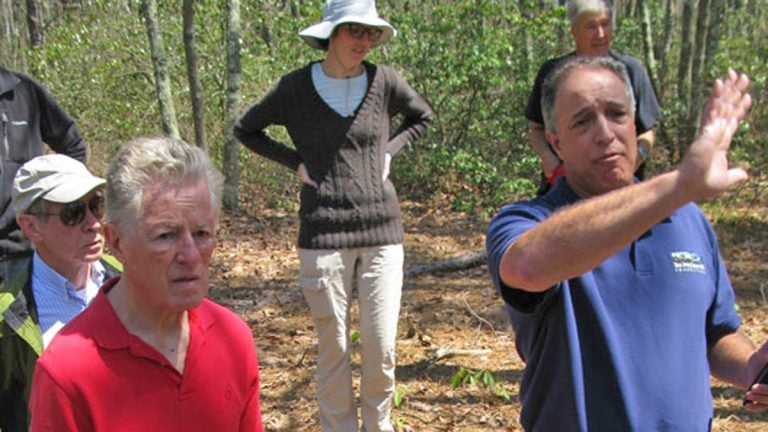NJ environmentalists file suit to stop Six Flags from clear-cutting 90 acres for solar farm

Former Gov. James Florio, left, and Emile DeVito, science director for New Jersey Conservation Foundation on the site where Six Flags wants to build its massive solar farm.
Trying to halt the clearing of 90 acres of environmentally sensitive forest to make way for a large solar farm at Six Flags Great Adventure in central New Jersey, environmental groups yesterday filed a lawsuit against the amusement park and the solar developer.
The project would create one of the state’s largest solar farms, producing enough electricity to make the popular park energy independent. The array of new solar panels would generate 21.9 megawatts of electricity, enough to power about 3,000 homes.
Instead of clearing forest on the edge of the Pine Barrens, opponents argued that the solar panels should be placed above its 100-acre parking lot, a proposal the park looked at and rejected because of concerns for its customers and increased project costs.
“Destroying 90 acres of forested habitat in the internationally renowned Pine Barrens is a bad idea on its face, but doing so under the guise of an environmentally beneficial project is absurd,’’ said Alison Mitchel, policy director of the New Jersey Conservation Foundation, one of the parties to the lawsuit.
Among other things, the lawsuit argues that the project violates Jackson Township’s master plan and a tree-removal ordinance, which sets explicit regulations for tree preservation and removal. According to some estimates at least 18,000 trees would be cut down if the project moves forward.
The project was approved on the same day rezoning by the planning board to allow it go forward was approved, according to conservation groups.
“The Barnegat Bay watershed begins in Jackson,’’ said Britta Forsberg, executive director of Save Barnegat Bay. “In this case, the trees and forests are currently providing an ecological service by absorbing the water.’’
Six Flags does not comment on lawsuits, according to Nancy Kresja, a corporate spokeswoman for the parent, which owns Great Adventure.
Previously, however, the president of Six Flags, issued a statement saying that the company considered the parking lot alternative, but ruled it out because it needed the space for parking and special events.
He also cited safety concerns with customers walking under the solar arrays in the parking lot. A bigger concern may have been the increased cost of installing solar panels in the parking lot than on the ground in the cleared forest. It could have increased costs by as much as 20 percent to 50 percent.
Other recreational facilities, however, have solar and other renewable-energy systems in their parking lots, including the Philadelphia Eagles Arena and the Rutgers basketball stadium, according to critics of the proposal.
The proposal seems to be odds with the Christie administration’s Energy Master Plan, which wants to steer large solar farms away from open space and instead have them built on unused land, such as brownfields (old manufacturing sites with pollution) or properly closed garbage dumps.
In the case of Six Flags, the electricity produced by the systems would not go to supply the power grid, but to meet its own energy needs.
The lawsuit was filed on the same day as a legislative panel in Trenton approved an aggressive ramping up of how much electricity in the state must come from renewable energy, a goal endorsed by most environmental groups.
___________________________________________________
NJ Spotlight, an independent online news service on issues critical to New Jersey, makes its in-depth reporting available to NewsWorks.
WHYY is your source for fact-based, in-depth journalism and information. As a nonprofit organization, we rely on financial support from readers like you. Please give today.




